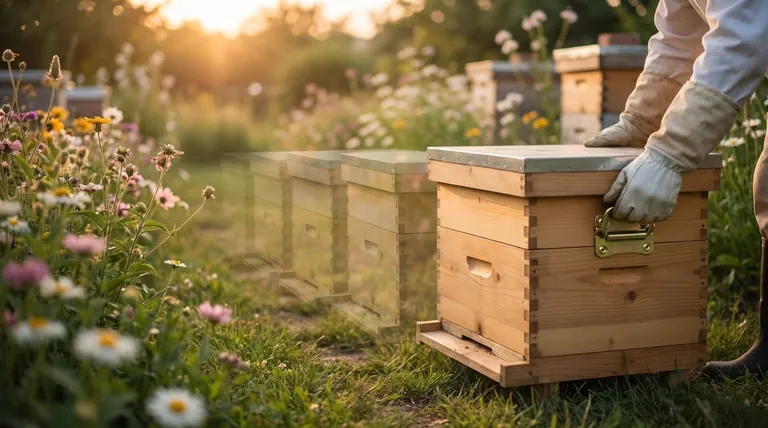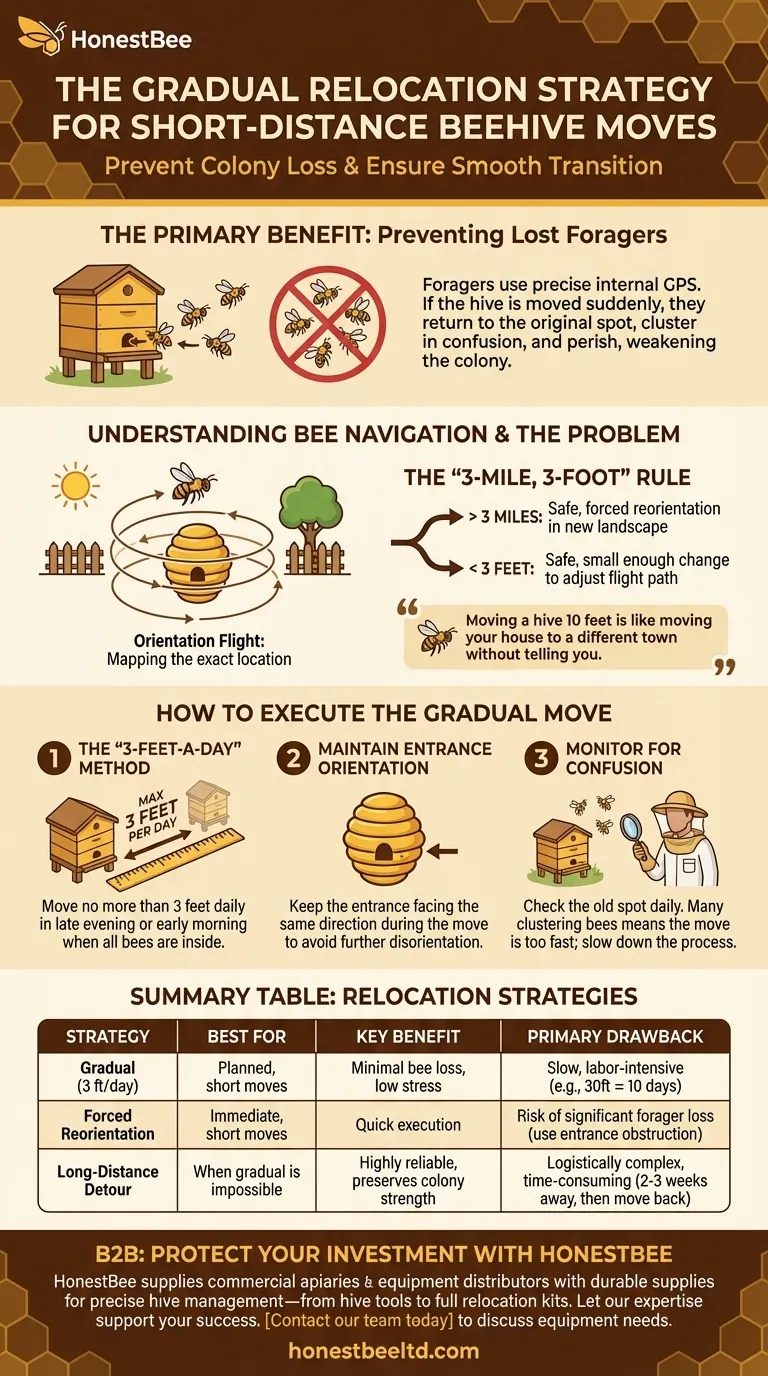The primary benefit of a gradual relocation strategy is to prevent your colony's foraging bees from becoming lost. When a hive is moved a short distance, foragers will use their powerful internal navigation to return to the exact original spot. If the hive is no longer there, they will cluster in confusion and eventually perish, significantly weakening the colony.
A honeybee's navigation system is so precise that moving its hive even ten feet is the equivalent of moving your house to a different town without telling you. The gradual relocation strategy works by making the daily change so small that the bees are forced to re-evaluate their flight path each day, ensuring the entire colony successfully adapts to the new location.

Understanding Bee Navigation: The Root of the Problem
To solve the challenge of a short-distance move, you must first understand how a bee "sees" the world. Their survival depends on an incredibly accurate GPS that is not easily reset.
The Orientation Flight
When a young bee first leaves the hive, it performs an orientation flight. It flies in expanding circles, facing the hive entrance, meticulously mapping its home's exact location relative to the sun and surrounding landmarks like trees, fences, and your house.
A Locked-In Location
Once this location is locked in, a foraging bee will return to that precise spot for the rest of its life. If you move the hive suddenly—even just across the yard—returning foragers will not search for it. They will fly directly to the old location and find nothing.
The "3-Mile, 3-Foot" Rule
This behavior is the origin of the most critical rule in beekeeping logistics: the "3-mile, 3-foot" rule.
- Moves over 3 miles are simple because the bees are forced to perform a new orientation flight in a completely unfamiliar landscape.
- Moves under 3 feet are safe because the change is small enough for the bees to notice upon exiting the hive, prompting them to adjust their flight path.
How to Execute the Gradual Move
The gradual strategy leverages the "under 3 feet" principle by breaking a larger move into a series of small, manageable steps.
The "3-Feet-a-Day" Method
The most common approach is to move the hive no more than three feet per day. This move should be done in the late evening or very early morning when all the bees are inside the hive.
Maintain the Entrance Orientation
During the move, try to keep the hive entrance facing the same direction. A sudden change in orientation can be as disorienting as a change in location. Once you reach the final destination, you can make small rotational adjustments over a few days.
Monitor for Confusion
Each day after the move, watch the old hive location. If you see more than a small handful of confused bees clustering, you may be moving the hive too quickly or too far in each step. Slow down the process to give them time to adapt.
Understanding the Trade-offs and Alternatives
The gradual method is effective but isn't always practical. Understanding its limitations allows you to choose the best strategy for your specific situation.
The Downside: It's Slow and Labor-Intensive
The primary drawback is time and effort. Moving a hive 30 feet will take you 10 days of consistent, daily work. This method also requires a clear, level, and unobstructed path between the starting point and the destination.
Alternative 1: The Long-Distance Detour
If a gradual move isn't feasible, the most foolproof alternative is to use the "3-mile" rule. Move the hive to a friend's property more than three miles away. After two to three weeks, the entire foraging force will have died off and been replaced by new bees oriented to the temporary location. You can then move the hive to its new, permanent spot on your property (less than 3 miles from the original spot) in a single step.
Alternative 2: Forcing Reorientation
For a sudden short-distance move, you can attempt to force the bees to reorient. After moving the hive overnight, place a large, leafy branch or a leaning piece of plywood directly in front of the entrance. This obstruction signals to the bees that something significant has changed, encouraging many of them to perform a new orientation flight rather than flying off on autopilot. This method is not 100% effective and you should expect to lose some foragers.
Making the Right Choice for Your Colony
Your decision should be based on your timeline, the landscape of your apiary, and your tolerance for bee loss.
- If your primary focus is colony safety and you have time: The gradual "3-feet-a-day" method is the gold standard for its low stress and minimal bee loss.
- If you must move the hive immediately across a short distance: Use the forced reorientation method with a branch, but be prepared to lose a portion of your foraging workforce.
- If your new location is on the same property but a gradual move is impossible: The long-distance detour is the most reliable, though logistically complex, way to ensure the entire colony remains intact.
By understanding the principles behind bee navigation, you can confidently select the relocation method that best protects your colony's strength and productivity.
Summary Table:
| Relocation Strategy | Best For | Key Benefit | Primary Drawback |
|---|---|---|---|
| Gradual (3 ft/day) | Planned, short-distance moves | Minimal bee loss, low colony stress | Slow, labor-intensive process |
| Forced Reorientation | Immediate, short-distance moves | Quick execution | Risk of significant forager loss |
| Long-Distance Detour | When gradual path is impossible | Highly reliable, preserves colony strength | Logistically complex and time-consuming |
Protect Your Investment and Ensure a Smooth Hive Transition
Moving your hives doesn't have to mean losing your valuable foragers. A successful apiary relies on strong, healthy colonies. At HONESTBEE, we supply commercial apiaries and beekeeping equipment distributors with the durable, reliable supplies needed for precise hive management—from hive tools to full relocation kits.
Let our wholesale-focused expertise support your operation's success. Contact our team today to discuss your equipment needs and ensure your next hive move is a complete success.
Visual Guide

Related Products
- Professional Grade Foldable Beehive Handles
- HONESTBEE Professional Long Handled Hive Tool with Precision Cutting Blade
- Professional Galvanized Hive Strap with Secure Locking Buckle for Beekeeping
- HONESTBEE Classic Pry Bar Hive Tool with High Visibility Finish for Beekeeping
- Premium Comfort Grip Spring-Loaded Hive Handles
People Also Ask
- What are the primary advantages of using a Movable Frame Bee Hive? Boost Your Honey Yield and Hive Health
- What technical advantages do movable-frame hives offer? Boost Modern Beekeeping Management and Honey Yields
- What are the primary technical advantages of movable-frame hives? Scale Your Honey Yield Today
- Why are modern movable frame hives preferred over traditional hives? Boost Your Commercial Apiary Efficiency
- What are the technical considerations for limiting a single apiary to 150 beehives? Optimize Forest Honey Production



















